 |
| Clément Cogitore on Michelangelo Antonioni and Apichatpong Weerasethakul: "who are my masters" Photo: Anne-Katrin Titze |
Nicholas Ray's Bitter Victory starring Richard Burton and Curd Jürgens to Stanley Kubrick's Paths Of Glory with Kirk Douglas, Ralph Meeker and Adolphe Menjou come to mind or the tension built with Kip (Naveen Andrews) checking for mines in Anthony Minghella's The English Patient, based on Michael Ondaatje's novel when reflecting on Neither Heaven Nor Earth (Ni Le Ciel Ni La Terre).
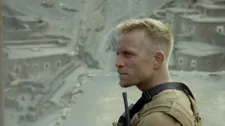 |
| Jérémie Renier is Captain Antarès Bonassieu |
Clément Cogitore's haunting debut feature stars Jean-Pierre Dardenne and Luc Dardenne discovery Jérémie Renier with Kévin Azaïs (Thomas Cailley's Love At First Fight, Catherine Corsini's Summertime), Swann Arlaud (Axelle Ropert's The Apple Of My Eye), Finnegan Oldfield (Thomas Bidegain's Les Cowboys, Eva Husson's Bang Gang), Sâm Mirhosseini, Marc Robert, Hamid Reza Javdan (Atiq Rahimi's The Patience Stone), Edouard Court, Steve Tientcheu, Aria Faghih Habib, Stéphane Boissel, Clément Bresson, and the voice of Chloé Astor.
Images (shot by Sylvain Verdet) of magnetic, eerie beauty transport us to the mysterious middle ground where Cogitore places his story of a group of French soldiers stationed in a remote mountain region in Afghanistan, at the Wakhan Front. Captain Antarès Bonassieu (Jérémie Renier) and his men are positioned near the border to Pakistan to monitor the "calm" region.
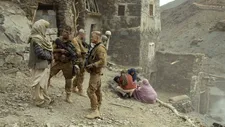 |
| Translator Khalil Khan (Sâm Mirhosseini) Sergeant Frering (Marc Robert) Captain Bonassieu |
The war and the unexplained disappearances have taken their toll on each one in a different way. Metaphors are laid out for the taking - or leaving. This is a psychological war film and also a tale of sheep and men. Cogitore tells of soldiers in crisis. While their bodies stay (mainly) intact, something inside them - the mind, the soul - is broken, or if you will, mended from beyond.
Anne-Katrin Titze: In Michelangelo Antonioni's L'Avventura, Anna disappears without a trace. Do you think Anna is with the four soldiers?
Clément Cogitore: I would love to. I would love that she is somewhere there.
AKT: She is in the same place?
CC: In the same place, invisible place.
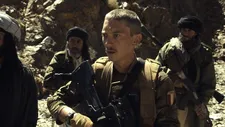 |
| Jérémie Lernowski (Swann Arlaud) at the Wakhan Front. |
AKT: There are some similarities in the disappearances. Did you think about that?
CC: Yes, of course, L'Avventura is one of the masterpieces. I grew up with Antonioni, his cinema. The strange thing is, I come from the art house and experimental cinephilia and I am a visual artist. So when I was writing this film, I was thinking I would like to be close to more mainstream-like film. When I was showing the film for the first time in Cannes last year, people told me about Antonioni and Weerasethakul - who are my masters - so I realised that I was not so far from my first loves of cinema.
AKT: I was thinking of Bitter Victory or Paths Of Glory, those kinds of war films.
CC: It was quite difficult and risky for my producer and me - as a first film by a young director and a new feature producer [Jean-Christophe Reymond] - to make a war film. American cinema with war is so strong and so heavy. To try something else, something more with war is really difficult. And we didn't have the same kind of budget. So the idea was to make a war film with all the codes of the genre but little by little to switch to another direction in which I feel more comfortable, which was more personal.
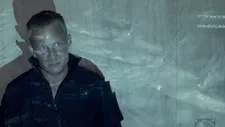 |
| On Jérémie Renier: "For each film, he completely transforms himself." |
AKT: The story includes the Sufi tale of the Seven Sleepers. There are many versions of that. Was that at the core of the plot for you?
CC: Yeah, it arrived in the script really early. What was important to me was to have an excerpt from the Bible and from the Quran, read together in the same film. The Book of Job and the Surah of the Cave. The priest is reading from the Book of Job and this text is about an angry God, who is punishing and in war against humanity, against Job. And the Surah of the Cave is this beautiful story or poetic tale. In the Muslim world, this is really famous.
For us, it looks like a fantasy story. In the Muslim world you could compare it to the story of Jesus transforming the water into wine. The relationship with the audience with this scene is really different in the western world. I showed the film in Cairo, in Beirut, in Algiers, in Morocco - it's completely different.
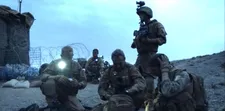 |
| Sylvain Verdet images of magnetic, eerie beauty transport us. |
AKT: Because everybody knows the story?
CC: Yes, and asks me directly the question: Why and how do you know this story?
AKT: Here it's a little bit like a Rip Van Winkle story.
CC: I don't know it.
AKT: It's the story of a man who falls asleep for many years and then returns to a changed world.
CC: Ah, an American story?
AKT: Yes, Rip Van Winkle by Washington Irving. In the Surah of the Cave, there is this commentary that it doesn't really matter how many people sleep and that it doesn't really matter how long they sleep. These are the wrong questions. You are doing something like that in your film, telling us, don't focus on the wrong things?
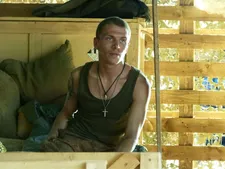 |
| William Denis (Kévin Azaïs): "The surprise was that when I met all of them ..." |
CC: In this scene it's the translator who reads not exactly the text. The character is telling the story and he is translating in his own way. It's the character who says, we don't know really. In the text it is written that some people say 100 years, some say 200. It's not a scientific or rational question. It's the story of absence. People missing.
AKT: Which is ultimately asking the question of death.
CC: Yeah. In the film the question of disappearance is for me a metaphor of death. How we deal with real disappearances. Like the plane that crashed somewhere in the ocean and we don't have any news. We don't know what happened exactly. Or the cases of a young boy or girl who is missing since they're ten years old and we don't know what happened. So how can human beings find a way to mourn.
AKT: You end the film with a helicopter. This might be silly, but speaking of tales made me think of another film that ends with a helicopter - Peau d'Âne.
CC: Peau d'Âne ends with a helicopter?
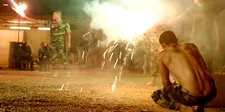 |
| Khalil Khan with Bax (Clément Bresson): "I love him. Actually, he was not an actor." |
AKT: Yes, Jacques Demy ends the fairy tale with the sudden appearance of a helicopter, throwing us out of the tale. Let's talk about your great ensemble of actors. You mentioned the interpreter [Sâm Mirhosseini] - where did you find him?
CC: I love him. Actually, he was not an actor.
AKT: He is a real interpreter and he knows what he is doing?
CC: Yes. He is a soldier. He was in the Foreign Legion. He plays in the film the role that he had to play in the army just before I met him. He was sent with a French platoon as a fighter and a translator. There are also civil translators. I wanted in the film to have a military translator. Sometimes they can be both, soldier and translator.
AKT: He is so real. He is the opposite - in acting style - of the Sultan. If you had an English version, that would be Al Pacino.
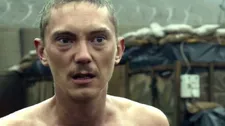 |
| "Swann Arlaud now is a quite famous emerging actor" |
CC: He is an Iranian actor, living in Paris, Hamid Reza Javdan. He played in Atiq Rahimi's film [The Patience Stone].
AKT: I saw it. In between these two extremes, you have all these other great actors. Jérémie Renier is a chameleon.
CC: Completely. That's what I love with him. For each film, he completely transforms himself. A lot of American actors do that but in France it's quite difficult.
AKT: Even in the Dardennes films, he is different in each one.
CC: When we talked about this film, we realized he never played that kind of role - physically strong and hard. It was maybe something missing in his filmography then. We realized that it's difficult to find a genre to the film. For the distributor, for example, it's quite hard to sell the film. It's not completely a war film, not completely fantasy film. There is no precise genre to the film and Jérémie as an actor can do everything - art house film and big famous comedy.
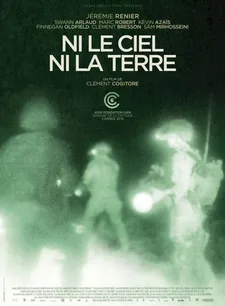 |
| Ni Le Ciel Ni La Terre French poster |
AKT: I loved the very first scene he has with Goliath, the dog. He gives water to the dog and he is clearly enjoying it. There is a smile on his face that is gone afterwards. Kévin Azaïs has also been quite a chameleon recently. His roles in Summertime and Love At First Fight are very different from this one.
CC: The surprise was that when I met all of them - Swann Arlaud now is a quite famous emerging actor - when I met them, they had only acted in short films or nobody knew them. It was my casting director [Tatiana Vialle] who made me meet them. I immediately felt they must be in the film. I didn't even do any screen tests.
AKT: You said, this is my group?
CC: This is the platoon! I was really confident in my casting director. We have worked together for many years.
Collaborating with Les Cowboys director Thomas Bidegain, invisible worlds, and Clément Cogitore's "confrontation between the rational system of thinking and mythology."
Neither Heaven Nor Earth (Ni Le Ciel Ni La Terre) is released on DVD in the UK on July 31.





















